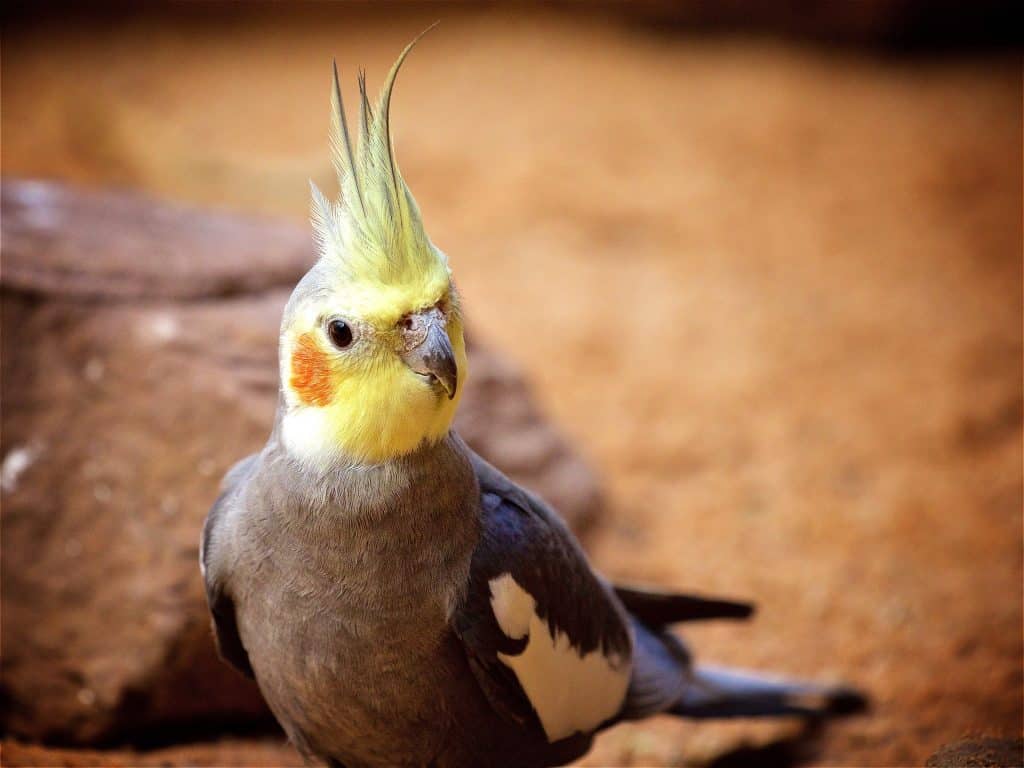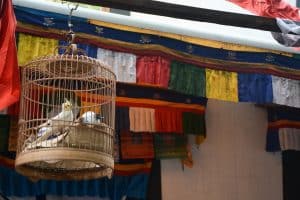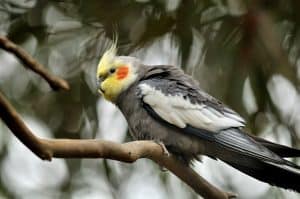Cockatiels are among the most popular pet parrot species, known for their charming personalities, beautiful plumage, and ability to mimic sounds. As a cockatiel owner or potential owner, it’s essential to understand the average cockatiel lifespan and the factors that can influence it. This knowledge will help you provide the best possible care for your feathered friend, ensuring they live a long, happy, and healthy life.
In this blog post, we will discuss the average lifespan of a pet cockatiel, the factors affecting their life expectancy, and tips for maximizing their lifespan. We’ll also explore the differences between wild cockatiels and domesticated cockatiels and how these differences impact their life expectancy.
Average Lifespan of a Pet Cockatiel
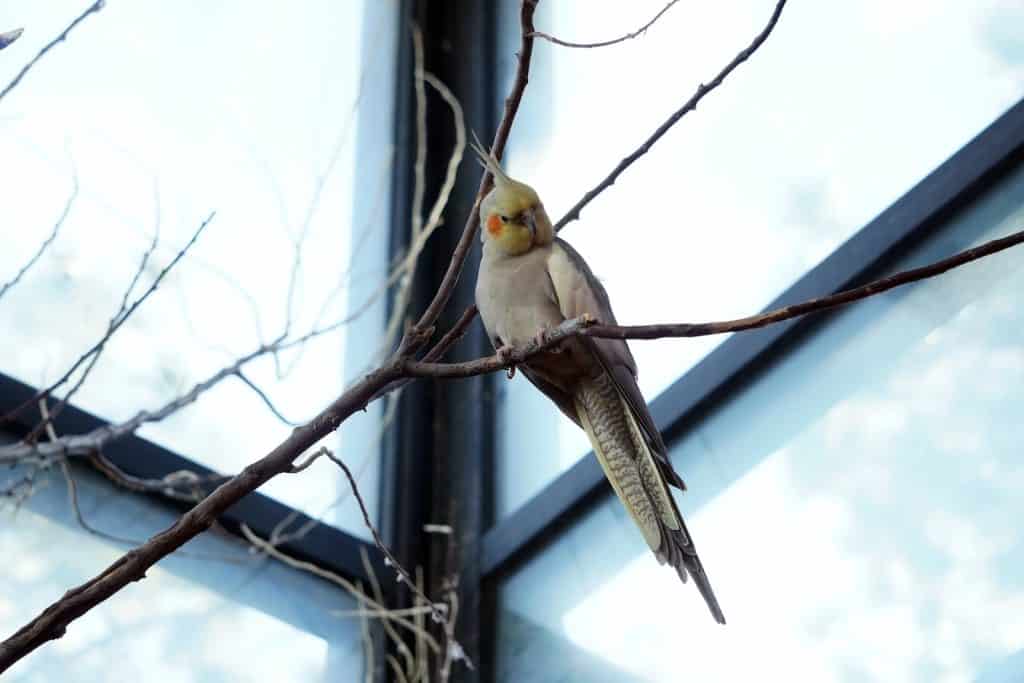
Cockatiel lifespan pet is typically longer than other pet birds, primarily due to their larger size and hardiness. Adult cockatiels generally have a life expectancy of 15-20 years, with some individuals even reaching their mid-20s. This makes the cockatiel bird lifespan one of the longest among pet parrots, surpassed only by larger parrot species like macaws and African greys.
However, it is essential to note that these numbers are not set in stone, and the lifespan of a cockatiel depends on various factors, including genetics, diet, environment, and overall health. Wild cockatiels, native to Australia, have a shorter lifespan, usually around 10-15 years, due to natural predators, diseases, and other environmental factors.
Factors Affecting a Cockatiel’s Lifespan

1. Diet
Proper nutrition is crucial for a cockatiel’s health and longevity. A balanced diet will ensure your pet cockatiel receives all the necessary nutrients required for optimal health. A high-quality cockatiel seed mix should form the basis of their diet, supplemented with fresh fruits, vegetables, and occasional protein sources such as boiled eggs and cooked lean meats.
It is essential to avoid feeding your cockatiel an all-seed diet, as seeds are high in fat and lack essential vitamins and minerals. Over time, an all-seed diet can lead to obesity, liver disease, and other health issues, significantly reducing your cockatiel’s lifespan. Also, be aware of potentially toxic foods such as avocado, chocolate, and onion, which should never be fed to your bird.
2. Environment
Your cockatiel’s environment plays a significant role in their overall health and life expectancy. A spacious and clean cage is crucial, allowing your bird ample room to move around and exercise, as well as preventing the buildup of bacteria and mold. Ensure the cage is equipped with perches of varying widths and textures, as this will promote healthy feet and prevent arthritis in older cockatiels.
Temperature and humidity also play a role in your cockatiel’s health. These birds thrive in temperatures between 65-80°F (18-27°C) and moderate humidity levels. Additionally, ensuring your bird receives adequate exposure to natural sunlight or UVB lighting is necessary for calcium absorption and overall well-being.
3. Socialization and Mental Stimulation
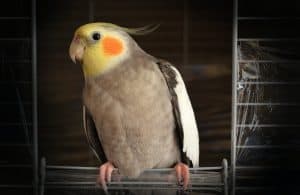
Cockatiels are social creatures that require regular interaction with humans and other birds to maintain their mental health. A lack of socialization can lead to stress, depression, and even self-mutilation in some cases, negatively impacting your cockatiel’s life expectancy. Spend time each day interacting with your bird, providing head scratches, and engaging in play with their favorite toys.
Mental stimulation is equally important, as a bored cockatiel can develop behavioral issues and suffer from a decline in overall health. Provide your bird with a variety of toys and rotate them regularly to keep their environment interesting and engaging.
4. Regular Health Check-ups
Routine veterinary visits are essential for maintaining your cockatiel’s health and catching potential issues before they become serious. Schedule annual check-ups with an avian veterinarian, and be vigilant for signs of illness, such as changes in appetite, energy levels, or droppings. Early detection and treatment of health problems can significantly impact your cockatiel’s lifespan.
5. Genetic Factors
Genetics can play a role in your cockatiel’s life expectancy, with inbreeding potentially leading to a shorter lifespan due to a higher risk of genetic diseases. Additionally, some color mutations may be associated with a reduced lifespan, although more research is needed to fully understand these relationships.
Tips for Maximizing Your Cockatiel’s Lifespan
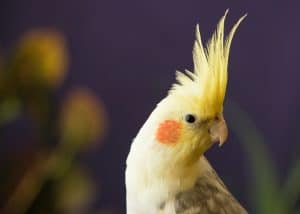
1. Provide a Balanced Diet
As mentioned earlier, a balanced diet is crucial for your cockatiel’s health and longevity. Provide a mix of high-quality cockatiel seed mix, fresh fruits and vegetables, and occasional protein sources to ensure they receive all the necessary nutrients.
2. Maintain a Clean and Safe Environment
Keeping your cockatiel’s cage clean and well-maintained will prevent the buildup of bacteria and mold, contributing to a healthier bird. Ensure the cage is spacious, with appropriate perches, toys, and hiding spots. Monitor the temperature and humidity levels, and provide access to natural sunlight or UVB lighting.
3. Socialize and Stimulate Your Bird
Spend time each day interacting with your cockatiel and providing mental stimulation through play and new toys. This will help maintain their mental health and happiness, contributing to a longer life expectancy.
4. Schedule Regular Veterinary Check-ups
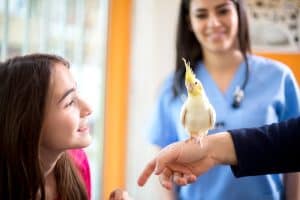
Don’t wait for signs of illness to take your cockatiel to the vet. Schedule annual check-ups to catch potential health issues early, and monitor your bird closely for any changes in behavior, appetite, or droppings that may indicate a problem.
5. Minimize Stress in Your Cockatiel’s Life
A stressed bird is more susceptible to illness and may have a shorter lifespan. Minimize stress by providing a stable, consistent environment, avoiding sudden changes in routine, and ensuring your bird has a safe space to retreat to when necessary.
Taming and Training Your Cockatiel for a Happier Life
A well-tamed and trained cockatiel is not only easier to handle but also tends to be a happier, more confident bird. Training your cockatiel to step up onto your finger, respond to basic commands, and even perform simple tricks can strengthen the bond between you and your pet while providing mental stimulation. Use positive reinforcement techniques, such as praise and treats, to encourage desired behaviors and ensure that training sessions are a positive experience for your bird. Regular training can contribute to a more fulfilling life for your cockatiel, leading to a longer and healthier lifespan.
Importance of Exercise for Cockatiel Health and Longevity
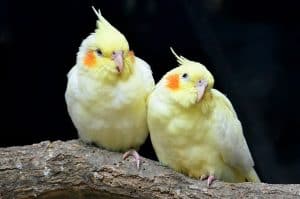
Just like humans, cockatiels require regular exercise to maintain a healthy weight, strong muscles, and good overall health. A sedentary lifestyle can lead to obesity and related health issues, which can negatively impact your cockatiel’s lifespan. Encourage exercise by providing a spacious cage, perches of varying widths, and toys that promote physical activity. Additionally, supervised out-of-cage time can provide your bird with the opportunity to stretch its wings and explore its surroundings, further contributing to its physical and mental well-being.
Proper Grooming and Hygiene for a Healthy Cockatiel
Maintaining proper grooming and hygiene practices can significantly impact your cockatiel’s health and longevity. Regularly trim your bird’s nails and flight feathers to prevent injuries and maintain their mobility. Provide a shallow dish of water or mist your bird with a spray bottle to encourage bathing, which helps keep their feathers clean and in good condition. It is also essential to monitor your cockatiel for signs of mites or other parasites and consult your veterinarian if you suspect an issue.
Creating a Bird-Safe Home Environment for Your Cockatiel
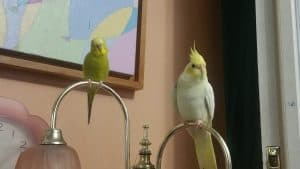
A bird-safe home environment is crucial for your cockatiel’s health and well-being. Eliminate potential hazards such as toxic plants, open water sources, and hot surfaces to prevent accidents and injuries. Be aware of air quality in your home, as birds are sensitive to airborne chemicals and pollutants. Avoid using air fresheners, scented candles, and non-stick cookware, which can release harmful fumes. By creating a safe and healthy home environment, you can help minimize the risk of accidents and illnesses that could shorten your cockatiel’s life.
- STURDY CONSTRUCTION - Made of the highest-quality iron frame with a black powder varnish guaranteed to make this birdcage sturdy and durable, even against playful birds; With 4 caster wheels at the bottom, so you can move it anywhere you like, saving you effort
- MULTIPLE DOORWAYS - Designed with 2 doorways for your pet birds to enter and exit; The top of the cage opens up and can be propped open with a wooden crossbeam for your birds to stand on; Traditional doors are located on the side of the cage
- SLIDE-OUT TRAY - Equipped with a plastic tray at the bottom of this bird cage that can be removed for easy cleaning, so as to keep a clean and tidy environment as well as keep your pets safe
- VARIOUS WAYS TO PLAY - Includes a swing and multiple bars to stand on; Convenient doors so you can change the food without disturbing your pets; Locking joints to keep the cage secure; With little design features that stand out among the crowd
- EXTRA STORAGE SPACE - Comes with an additional mesh shelf so you can store food and toys out of the way; Provided with a wealth of accessories, including 4 Wooded perches, 4 Feeding cups, and 1 swing
Understanding and Responding to Your Cockatiel’s Body Language
Cockatiels communicate their emotions and needs through a variety of body language cues. Learning to understand and respond appropriately to these signals can help you build a stronger bond with your bird and ensure their needs are met. A happy and content cockatiel will exhibit a relaxed body posture, and smooth feathers, and may even grind its beak as a sign of contentment. In contrast, a stressed or frightened bird may have fluffed feathers, rapid breathing, or display aggressive behaviors such as lunging or hissing. By recognizing and addressing your cockatiel’s emotional state, you can help maintain their mental health and contribute to a longer, happier life.
Preventing and Addressing Behavioral Issues in Cockatiels
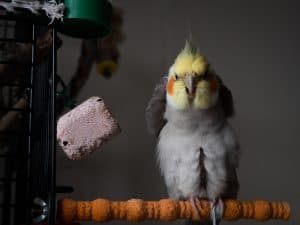
Proactively addressing and preventing behavioral issues, such as excessive screaming or feather plucking, can contribute to a happier and healthier cockatiel. Understand the causes of these behaviors and implement strategies to mitigate them, such as providing mental stimulation, consistent routines, and appropriate socialization.
The Role of Proper Sleep in Your Cockatiel’s Lifespan
Ensuring your cockatiel receives adequate sleep is crucial for its health and well-being. Establish a consistent sleep schedule and provide a quiet, dark environment during rest periods to promote restorative sleep and reduce stress levels in your bird.
Introducing Your Cockatiel to Other Pets
If you have other pets at home, it’s essential to introduce them to your cockatiel gradually and safely. Proper introductions can help prevent stress, injuries, and potential conflicts, creating a harmonious home environment for all your pets and contributing to your cockatiel’s overall well-being.
Monitoring and Maintaining Your Cockatiel’s Weight
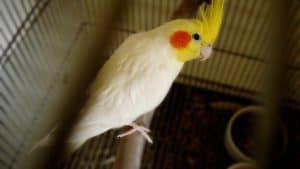
Regularly monitoring your cockatiel’s weight can help you identify potential health issues early and adjust your diet and exercise routines accordingly. Maintaining a healthy weight contributes to your bird’s overall health and longevity.
The Importance of Calcium in Your Cockatiel’s Diet
Calcium is a vital nutrient for your cockatiel’s bone health, muscle function, and overall well-being. A deficiency in calcium can lead to a variety of health issues, including weak bones, egg binding in females, and even seizures. To ensure your bird receives adequate calcium, provide a balanced diet that includes calcium-rich foods such as dark leafy greens, cuttlebone, or a mineral block. You can also consult your veterinarian for recommendations on appropriate calcium supplements for your cockatiel.
Dealing with Seasonal Changes and Their Impact on Your Cockatiel’s Health
As the seasons change, so do the temperature, humidity, and daylight hours. These fluctuations can impact your cockatiel’s health, mood, and even trigger hormonal changes that can lead to behavioral issues. To help your bird adjust to seasonal changes, maintain a consistent indoor temperature and humidity, and gradually adjust their exposure to natural light or artificial UVB lighting. Be mindful of your bird’s behavior during these times, and consult your veterinarian if you notice any concerning changes.
Traveling with Your Cockatiel: Ensuring a Safe and Stress-Free Experience
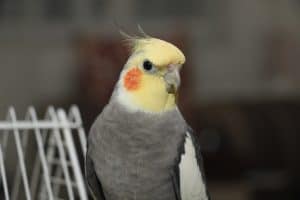
Whether it’s a short trip to the vet or a longer journey, traveling can be a stressful experience for your cockatiel. To minimize stress and ensure their safety, invest in a secure and well-ventilated travel carrier, and acclimate your bird to the carrier before embarking on your journey. During travel, monitor your cockatiel’s behavior and comfort, providing fresh water, food, and comforting items such as a familiar toy or blanket. By taking the necessary precautions and planning ahead, you can help make traveling a smoother experience for your cockatiel.
The Benefits of Foraging and Enrichment Activities for Your Cockatiel’s Mental Health
Foraging is a natural behavior for cockatiels in the wild, and incorporating foraging opportunities and enrichment activities into your bird’s daily routine can greatly benefit their mental health. Foraging encourages problem-solving, reduces boredom, and helps prevent behavioral issues such as feather plucking or excessive screaming. Provide foraging toys, hide treats in their cage, or create DIY foraging activities to stimulate your cockatiel’s mind and promote a happier, healthier bird.
Recognizing and Addressing Common Cockatiel Health Issues
As a cockatiel owner, it’s essential to be aware of common health issues that can affect your bird and know how to recognize the early signs of illness. Some common health problems in cockatiels include respiratory infections, digestive issues, and feather plucking. Familiarize yourself with the symptoms of these conditions, monitor your bird closely for any changes in behavior or appearance, and consult your veterinarian if you suspect a health issue. Early detection and treatment can greatly improve your cockatiel’s chances of recovery and contribute to a longer, healthier life.
In Conclusion
Cockatiels can be wonderful and long-lived pets, cockatiels live an average of 10 to 15 years with proper care and nutrition. Young cockatiels require frequent training, exercise, and grooming to develop good behaviors and maintain physical health. Additionally, creating a bird-safe home environment and learning to recognize your cockatiel’s body language signals can help ensure they remain happy and healthy over the course of their lifetime. By providing appropriate care for your feathered friend, you can ensure that your pet enjoys a long and healthy life.
Remember, the key to a long and happy life for your cockatiel lies in proper nutrition, a clean and safe environment, socialization, mental stimulation, and regular veterinary care. With dedication and attention to your bird’s needs, you can help ensure they live a long, healthy, and fulfilling life as a cherished member of your family.
Other suggested articles:
